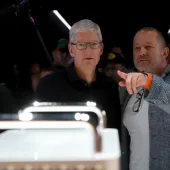The Evolution of the iPod: From Revolutionizing the Music Industry to Fading into Obscurity
The iPod was first introduced to the world in 2001 by Steve Jobs, the co-founder and former CEO of Apple Inc. Jobs, who had a passion for music, recognized the potential of a device that could store and play thousands of songs in a small, portable package. The first iPod had a 5GB hard drive, could hold up to 1,000 songs, and was priced at $399. Despite its high cost, the iPod quickly became a must-have item for music lovers around the world.
The success of the iPod can be attributed to several factors. First, it was easy to use. The simple interface and intuitive controls made it easy for even the most technologically challenged individuals to use. Second, it was stylish. The sleek design of the iPod, with its white earbuds and minimalist aesthetic, made it a fashion accessory as well as a music player. Third, it was compatible with iTunes, Apple's digital music service, which made it easy for users to download and manage their music.
Over the years, Apple continued to improve the iPod, releasing new models with larger capacities, longer battery life, and new features such as video playback and games. In 2005, Apple introduced the iPod Shuffle, a smaller, more affordable version of the iPod that could hold up to 240 songs. The following year, Apple released the iPod Nano, a thinner and lighter version of the iPod with a color screen and the ability to play videos.
In 2007, Apple revolutionized the music industry once again with the introduction of the iPhone, which included an iPod app that allowed users to store and play music on their phone. While the iPod continued to be a popular device, sales began to decline as more people turned to their smartphones for music playback.
In 2010, Apple released the iPod Touch, which was essentially an iPhone without the phone functionality. The iPod Touch had a larger screen, faster processor, and access to the App Store, making it a popular choice for gaming and web browsing. However, even with these new features, the iPod Touch was unable to compete with the iPhone, which continued to dominate the market.
In 2017, Apple quietly discontinued the iPod Nano and iPod Shuffle, leaving only the iPod Touch as the last remaining device in the iPod lineup. While the iPod had a profound impact on the music industry and society as a whole, it eventually became a victim of technological advancements and changing consumer behavior.
In conclusion, the iPod was a groundbreaking device that transformed the way people listened to music. From its initial release in 2001 to its eventual demise in 2017, the iPod had a profound impact on the music industry and society as a whole. While the iPod may be a thing of the past, its legacy lives on, and it will always be remembered as a device that revolutionized the way we experience music.



